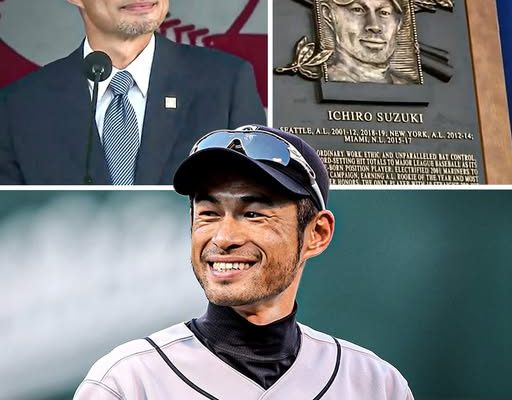In a moment that will forever be etched in the annals of sports history, Ichiro Suzuki has officially been inducted into the National Baseball Hall of Fame, becoming the first Japanese-born player to receive the game’s most prestigious honor. For many fans around the world, and particularly in Japan, this was more than a personal accolade—it was a cultural milestone, a victory decades in the making, and a celebration of global excellence in a sport long dominated by American tradition. Suzuki’s induction not only honors an extraordinary individual career but also signifies the breaking of barriers and the global evolution of baseball itself.
Ichiro’s journey to Cooperstown began on the baseball diamonds of Japan, where his talents became evident from an early age. Born in Kasugai, Aichi, Japan, Ichiro developed a passion for the game under the tutelage of his father, Nobuyuki Suzuki, who pushed him through rigorous daily routines and training drills. That early discipline translated into a highly successful career with the Orix BlueWave in Japan’s Nippon Professional Baseball (NPB), where he quickly became a household name. By the time he left for Major League Baseball, Ichiro had already earned seven consecutive batting titles in the Pacific League and was recognized as one of the most dominant players in Japanese baseball history.
When Ichiro signed with the Seattle Mariners in 2001, skepticism ran rampant. Critics questioned whether his smaller frame and slap-hitting style could translate against the firepower of American pitching. But Ichiro silenced those doubts almost immediately. In his rookie season, he led the majors in batting average (.350) and stolen bases (56), becoming the first player since Fred Lynn in 1975 to win both Rookie of the Year and MVP in the same season. From that moment forward, Ichiro wasn’t just a baseball star—he was a revelation.
Over the course of his MLB career, Ichiro amassed 3,089 hits, making him one of only 32 players in the 3,000-hit club. When combined with his 1,278 hits in Japan, his total of 4,367 professional hits surpasses Pete Rose’s MLB record, though Rose’s total remains the official benchmark in MLB’s eyes. Nonetheless, the sheer volume and consistency of Ichiro’s contact hitting put him in a class of his own. No player in history had such a blend of durability, precision, and artistry at the plate. He also set the single-season MLB record for hits with 262 in 2004, a mark that still stands.
But Ichiro was more than just a hitting machine. He was an elite defensive player as well, earning ten consecutive Gold Gloves as a right fielder. His powerful and accurate throwing arm became legendary, turning base runners’ ambitions into highlight-reel fodder. Countless runners who dared test his arm were left stunned, as Ichiro delivered laser-like throws from right field to third base or home plate with pinpoint accuracy. He patrolled the outfield with a grace that belied the effort it took, always seeming to be in the right place at the right time.
Ichiro’s demeanor also captivated fans and fellow players. Known for his meticulous pre-game routines, unparalleled work ethic, and Zen-like focus, Ichiro became a figure of admiration and intrigue across both sides of the Pacific. He rarely gave away emotion on the field but carried himself with quiet confidence and deep reverence for the game. His interviews—when he gave them—were filled with wit, humility, and moments of unexpected humor, often bridging cultural gaps with his unique charisma.
His presence also helped usher in a new era of internationalization for MLB. While Hideo Nomo had opened the door for Japanese players in the ’90s, it was Ichiro who blew it off its hinges. His success validated the talent coming from Japan and encouraged MLB teams to scout and invest in Japanese prospects more vigorously. Players like Shohei Ohtani, Yu Darvish, and Masahiro Tanaka all followed in Ichiro’s footsteps, but it was Ichiro who gave them—and millions of others—a clear path to the major leagues and a visible model of excellence to aspire toward.
Ichiro’s influence extended beyond just the numbers and trophies. His success bridged cultures and generations, turning baseball into a more inclusive and global sport. In Japan, he became a national icon, revered not just as a ballplayer but as a symbol of discipline, perseverance, and humility. In the United States, he gained respect through performance and professionalism, ultimately becoming one of the most beloved foreign-born players to ever grace an American field. His reach transcended borders, uniting fans from vastly different cultures under a shared appreciation for his talents.
His induction into the Hall of Fame was not only inevitable—it was long-awaited. During the ceremony in Cooperstown, emotions ran high as fellow inductees, former teammates, family members, and thousands of fans from across the globe gathered to celebrate the legacy of a man who had given so much to the game. Ichiro, true to form, delivered a speech filled with gratitude, humility, and deep reflection. He thanked his parents, his Japanese coaches, his Mariners teammates, and the fans who had supported him throughout his remarkable journey. He spoke in both English and Japanese, a subtle but powerful gesture underscoring the global nature of his impact.
Baseball’s greatest cathedral, the Hall of Fame, now houses Ichiro’s jersey, gloves, and bats alongside those of Ruth, Mays, Aaron, and Clemente. For a player who respected tradition as deeply as Ichiro did, this was a fitting final destination. And for the game of baseball, his enshrinement marks a critical moment of acknowledgment—that greatness knows no nationality, that barriers are meant to be broken, and that the future of the sport lies in embracing its global roots.
Ichiro’s legacy will endure not just in record books, highlight reels, or memorabilia displays, but in the countless young players across the world who lace up their cleats dreaming of greatness. His life and career have shown that it’s possible to cross oceans, defy doubts, and redefine history with patience, precision, and purpose. His story is one of quiet domination, of excellence by repetition, and of an unwavering love for the craft of baseball.
Now that he stands among the immortals in Cooperstown, the image of Ichiro tipping his cap—lean frame draped in Mariners navy and teal, eyes locked in with surgical calm—will serve as a timeless symbol of everything baseball can be when played with heart, intelligence, and respect. The Hall of Fame has gained a legend, and the sport has been forever changed by the presence of Ichiro Suzuki.



